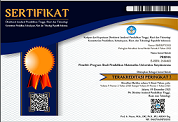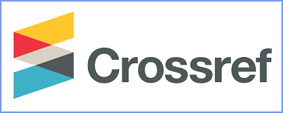The Effect of The Implementation of Guided Inquiry-Based Worksheet on The Empire Ability and Self-Efficacy of High School Students
Abstract
Keywords
Full Text:
PDF(BAHASA INGGRIS)References
Abadi Prastowo, A. (2014). Panduan Kreatif Membuat Bahan Ajar Inovatif. Diva Press.
Annas, S., Djadir, & Hasma, S. M. (2018). The Abstraction Ability in Constructing Relation Within Triangles by the Seventh Grade Students of Junior High School. Journal of Physics: Conference Series, 954(1). https://doi.org/10.1088/1742-6596/954/1/012029
Bandura, A. (1977). Self-Efficacy: Toward a Unifying Theory of Behavioral Change. In Psychological Review (pp. 191–215).
Darusman, C. (2008). Efektifitas Penggunaan LKS dalam Melatih Kecakapan Berfikir Rasional Materi Perbandingan di SMP Negeri 1 Gelumbang. Universitas Sriwijaya.
Dewi, D. R. (2010). Implementasi Strategi Pembelajaran Practice Rehearsal Pairs Berbasis Portofolio Dalam Pembelajaran Matematika Untuk Mengembangkan Kemampuan Berfikir Kritis Siswa (PTK Kelas VII SMP Al Islam 1 Surakarta Tahun Ajaran 2009/2010). Universitas Muhammadiyah Surakarta.
Dewi, I., & Andriani, A. (2019). Pengembangan Lembar Kerja Siswa (LKS) berbasis Budaya Melayu untuk Meningkatkan Kemampuan Abstraksi Matematis. Seminar Nasional Matematika Dan Pendidikan Matematika (4th SENATIK), 160–167.
Fahyuni, E. F. (2016). Developing Of Learning Tool at IPA Subject by Guided Inquiry Model to Improve Skills Science Process an Understanding Concepts SMPN 2 Porong. Proceedings of International Research Clinic & Scientific Publications of Educational Technology, 1989, 352–361.
Gray, E. M., & Tall, D. O. (2007). Abstraction As a Natural Process of Mental Compression. Mathematics Education Research Journal, 19(2), 23–40. https://doi.org/10.1007/BF03217454
Hanson, D. M. (2015). Designing Process-Oriented Guided-Inquiry Activities. January 2007.
Ika, J., Sumarti, S. S., & Widodo, A. T. (2017). Penerapan Model Pembelajaran Inkuiri Terbimbing Terhadap Self Efficacy dan Hasil Belajar Kimia pada Materi Koloid. Journal of Innovative Science Education, 6(1), 49–58.
Julyanasari, N., Praja, E. S., Noto, M. V., Sunan, U., & Djati, G. (2019). Problem Based Learning Model on The Ability of Students Mathematical Connection. PRISMA, 8(2), 167–172. https://doi.org/10.35194/jp.v8i2.400
Jumroh, Mulbasari, A. S., & Fitriasari, P. (2018). Self-Efficacy Siswa Dalam Pembelajaran Based Learning Di Kelas Vii Smp Palembang. Jurnal Pendidikan Matematika RAFA, 4(1), 29–42.
Kandil, S., & Işıksal-Bostan, M. (2019). Effect of inquiry-based instruction enriched with origami activities on achievement, and self-efficacy in geometry. International Journal of Mathematical Education in Science and Technology, 50(4), 557–576. https://doi.org/10.1080/0020739X.2018.1527407
Komala, E., & Sarmini, S. (2020). Kemampuan Representasi Simbolik Matematik Siswa SMP Menggunakan Blended Learning. Prisma, 9(2), 204. https://doi.org/10.35194/jp.v9i2.1078
Kusumawati, R., & Kurniawan, P. (2020). Pengembangan Bahan Ajar Stuktur Aljabar dengan Penemuan Terbimbing untuk Meningkatkan Kemampuan Abstraksi dan Menulis Bukti Matematika. Journal of Medives : Journal of Mathematics Education IKIP Veteran Semarang, 4(1), 197. https://doi.org/10.31331/medivesveteran.v4i1.1010
Ningrum, P., & Rahmawati, R. D. (2021). Pengaruh Self Efficacy Terhadap Prestasi Belajar Matematika Siswa Sd Dalam Pembelajaran Daring. Prima Magistra: Jurnal Ilmiah Kependidikan, 3(1), 41–47. https://doi.org/10.37478/jpm.v3i1.1394
Nurhikmayati, I. (2017). Kesulitan Berpikir Abstrak Matematika Siswa Dalam Pembelajaran Problem Posing Berkelompok. KALAMATIKA Jurnal Pendidikan Matematika, 2(2), 159. https://doi.org/10.22236/kalamatika.vol2no2.2017pp159-176
Pardimin, P. (2018). Self-Efficacy Matematika Dan Self-Efficacy Mengajar Matematika Guru Matematika. Jurnal Ilmu Pendidikan, 24(1), 29. https://doi.org/10.17977/um048v24i1p29-37
Pawuri, M. F. Y. (2013). Efektivitas Penggunaan Metode Inkuiri Terbimbing Pada Pokok Bahasan Prisma dan Limas Terhadap Hasil Belajar, Keaktifan dan Kemampuan Berpikir Kritis Siswa Kelas VIII Smp Theresiana Jambu, Kabupaten Semarang Tahun Ajaran 2012/2013. Universitas Sanata Dharma.
Rahmawati, N. I. (2018). Pemanfaatan ICT dalam Meningkatkan Kemampuan Literasi Matematika. PRISMA, 1, 381–387.
Rohmah, W. N., Septian, A., & Inayah, S. (2020). Analisis Kemampuan Penalaran Matematis Materi Bangun Ruang Ditinjau Gaya Kognitif Siswa Menengah Pertama. PRISMA. https://doi.org/10.35194/jp.v9i2.1043
Sadiyyah, R., Gustiana, M., Panuluh, S. D., & Sugiarni, R. (2019). Pengembangan Lembar Kerja Siswa (Lks) Dengan Pendekatan Inkuiri Terbimbing Berbasis Mobile Learning Untuk Mengoptimalkan Kemampuan Berpikir Kritis Matematis. Prisma, 8(1), 80. https://doi.org/10.35194/jp.v8i1.616
Sanjaya, W. (2006). Strategi Pembelajaran. Kencana Prenada Media Group.
Septian, A., & Gustiana, M. (2022). Pengembangan Lembar Kerja Siswa pada Materi Sistem Persamaan Linear Dua Variabel Berbasis E-Learning. UNION : Jurnal Ilmiah Pendidikan Matematika, 10(1), 81–92.
Septian, A., & Maghfirah, D. (2021). Mathematical Literacy Skills using Google Classroom on Trigonometry. AKSIOMA: Jurnal Program Studi Pendidikan Matematika, 10(4), 2515–2525. https://doi.org/10.24127/ajpm.v10i4.4263
Septian, A., Muhammad, G. M., & Rahmah, I. Z. (2022). Kemampuan Literasi Matematis Siswa Melalui Model Learning Cycle Berbantuan Google Classroom. Jurnal Padegogik, 5(1), 1–10. https://doi.org/https://doi.org/10.35974/jpd.v5i1.2634
Sulistiyo, M. A. S., & Wijaya, A. (2020). The Effectiveness of Inquiry-Based Learning on Computational Thinking Skills and Self-Efficacy of High School Students. Journal of Physics: Conference Series, 1581(1). https://doi.org/10.1088/1742-6596/1581/1/012046
Suryawan, I. P. P., & Permana, D. (2020). Media Pembelajaran Online Berbasis Geogebra sebagai Upaya Meningkatkan Pemahaman Konsep Matematika. Prisma, 9(1), 108. https://doi.org/10.35194/jp.v9i1.929
Suweken, G. (2021). Vektor Sebagai Konten Pembelajaran Daring Pada Kelas X Di SMA Negeri 1 Blahbatuh The Development of Interactive Dynamic Student ’ Worksheets on Vector Material as Online Learning Content in Class X SMA Negeri. XI, 356–365.
Tsany, U. N., Septian, A., & Komala, E. (2020). The Ability of Understanding Mathematical Concept and Self-Regulated Learning using Macromedia Flash Professional 8. Journal of Physics : Conference Series, 1657(1), 012074. https://doi.org/10.1088/1742-6596/1657/1/012074
Yunita, A. E. (2017). Meningkatkan Kemampuan Abstraksi Matematis Siswa dengan Menerapkan Pembelajaran Blended Learning Berbasis Chamilo: Penelitian Kuasi Eksperimen terhadap Siswa Kelas XI IPA 1 SMA Al-Ma’soem. UIN Sunan Gunung Djati Bandung.
DOI: https://doi.org/10.35194/jp.v11i1.2078
Refbacks
- There are currently no refbacks.
Copyright (c) 2022 PRISMA
Prisma Indexing :Â

PRISMA by UNIVERSITAS SURYAKANCANA is licensed under a This work is licensed under a Creative Commons Attribution-ShareAlike 4.0 International License.Based on a work at https://jurnal.unsur.ac.id/prisma.


1.jpg)








